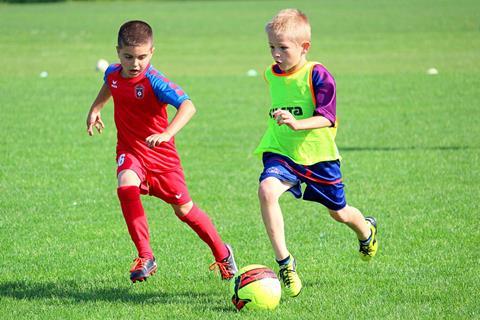Jonny Reid helps Christian parents think about the positive ways they can see sport from a faith perspective

If you’re reading this, I guess you are parenting a child who loves sport—possibly to the point of obsession. Maybe you love it too. Whether your weekends are spent on muddy sidelines or at early‑morning training sessions, you’re probably asking deeper questions about how all this sporting enthusiasm connects with your Christian faith.
So, let me start by asking: which of these three views on sport best describes you?
-
You feel a bit guilty about how much your child loves sport. It seems like a distraction—shouldn’t “proper Christians” be doing “proper Christian things”?
-
You see sport as useful—for fitness, teamwork, maybe even evangelism—but you’re uneasy about some of its darker sides: hyper‑competitiveness, the drama on the sidelines, the obsession with winning.
-
You think sport is great, full stop—but you’ve never really considered how it might connect with your faith.
In my experience, most Christian parents land in one of those three camps. But what if there’s another way?
In this short series, over the next few weeks, I want to offer a fourth approach—one that starts not with sport, but with God. We’ll take some of the ideas explored in the book I co‑authored, Spiritual Game Plan: Competing with Joy and Godliness, and ask: Why would God create something like sport in the first place?
As we explore that question, we’ll uncover a deeper, more joyful, and more purposeful way of thinking about sport—not just for our children but for ourselves.
Here are five reasons why God made sport.
1. God made sport because he is creative
God is a creator. From the vastness of space to the detail of a dragonfly’s wing, his creativity is stunning. And he made us, in his image, to reflect that creativity.
In Genesis 2:15 we read: “The Lord God took the man and put him in the Garden of Eden to work it and take care of it.”
God’s world was good—but it wasn’t finished. He invited us to develop and cultivate it. This ’creation mandate’ includes inventing games, developing rules, and forming teams and leagues. Sport is one expression of our God‑given creativity.
When your child figures out a new move on the pitch or works out how to beat their opponent, they are creating—mirroring the God who made them. Every time they play, they’re living out a little bit of the image of God in them.
If your child loves sport, encourage them to keep going! Help them see how it connects with the God who made them, the saviour who loves them, and the Spirit who is shaping them.
2. God made sport as a communal activity
From eternity, God has existed in loving relationship—Father, Son, and Spirit. And because we’re made in his image, we’re wired for community too.
At its best, sport brings people together. Perhaps you’ve already seen it: how a shared love of the game forms deep friendships that last a lifetime.

Sport isn’t just good for your child’s friendships—it’s good for families. It gives us chances to share life with our children: the highs and lows, the wins and defeats, the challenges and celebrations. These are precious discipleship moments—opportunities to talk about character, emotions, and faith; opportunities to speak into the inevitable challenges sport brings.
3. God made sport for us to have joy
If your child is wired to love sport, that’s no accident—it’s a gift.
When God made the world, he delighted in it. Eden wasn’t just functional; it was full of abundance and joy. Sport, too, can be a joyful celebration of the bodies God has given us and the world we live in.
Pastor Jeremy Treat captures it beautifully: “Like a father who builds a sandbox for his children, God is honored and takes joy when his sons and daughters delight in his workmanship. The world, as it has been said, is the theatre of God’s glory, but it is also the playground for God’s goodness.”
So, when your child delights in the game—when they run, jump, hit, and swim—they’re not just having fun. They’re enjoying a gift from their heavenly Father. And every good gift points us back to him, the giver of all good gifts.
Read more
Should you let your child play sport on Sunday?
Helping your child’s faith when they are passionate about their sport
The next Messi or Ronaldo? How to support your child’s elite sports ambitions as a Christian parent
4. God made sport for us to praise him
Ultimately, we were made to glorify God. Isaiah 43:7 says: “Everyone who is called by my name, whom I created for my glory, whom I formed and made.”
Think about how we instinctively celebrate excellence in sport. We cheer great goals, award medals, and give praise where it’s due.
In the same way, when we recognise the beauty of God’s design—whether in a breathtaking goal or the joy on a child’s face—we’re invited to respond in worship. God is always worthy of our praise.
So, when your child plays sport with joy, gratitude, and humility, they’re doing what they were made to do: giving glory to the one who made them.
5. God made sport to disciple us
Sport isn’t perfect. It reflects the brokenness of a fallen world—pride, anger, idolatry, selfish ambition. But, just like anything else in life, God can use sport to shape us to be more like Jesus.
Romans 8:28 reminds us: “And we know that in all things God works for the good of those who love him, who have been called according to his purpose.”
In the joys and the disappointments—whether your child is winning trophies or facing injury or defeat—God is at work. Sport becomes a classroom for discipleship, forming character, humility, perseverance, and trust in God.
Sport is something God cares about. Sport is something you and your children can enjoy as Christians. Sport is something that is part of your relationship with God.
So, if your child loves sport, encourage them to keep going! Help them see how it connects with the God who made them, the saviour who loves them, and the Spirit who is shaping them.
Sport can be one of the ways they come to know and love God more deeply.
This is why God made sport.










































